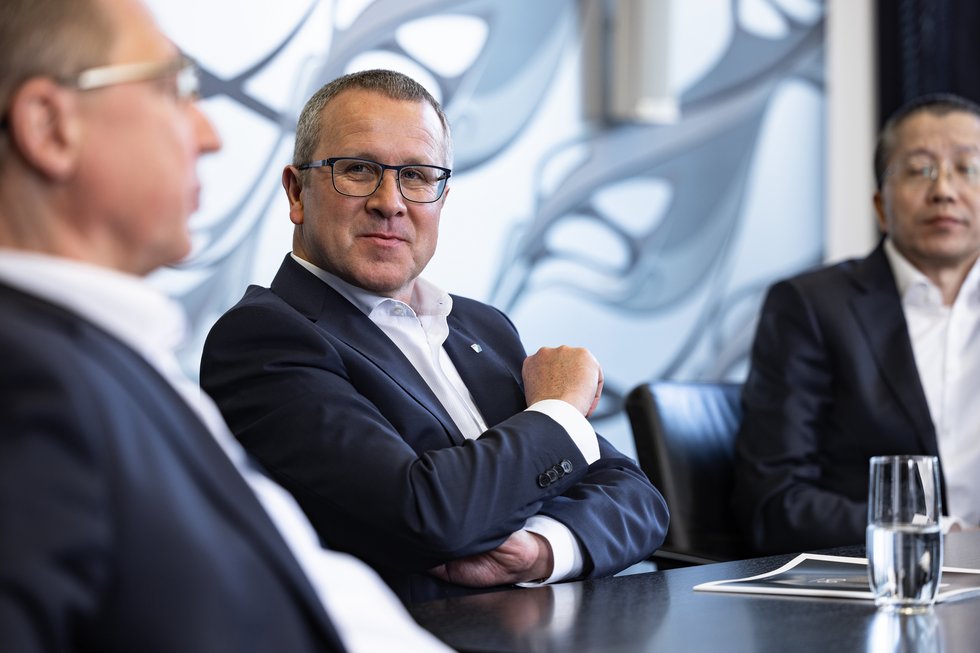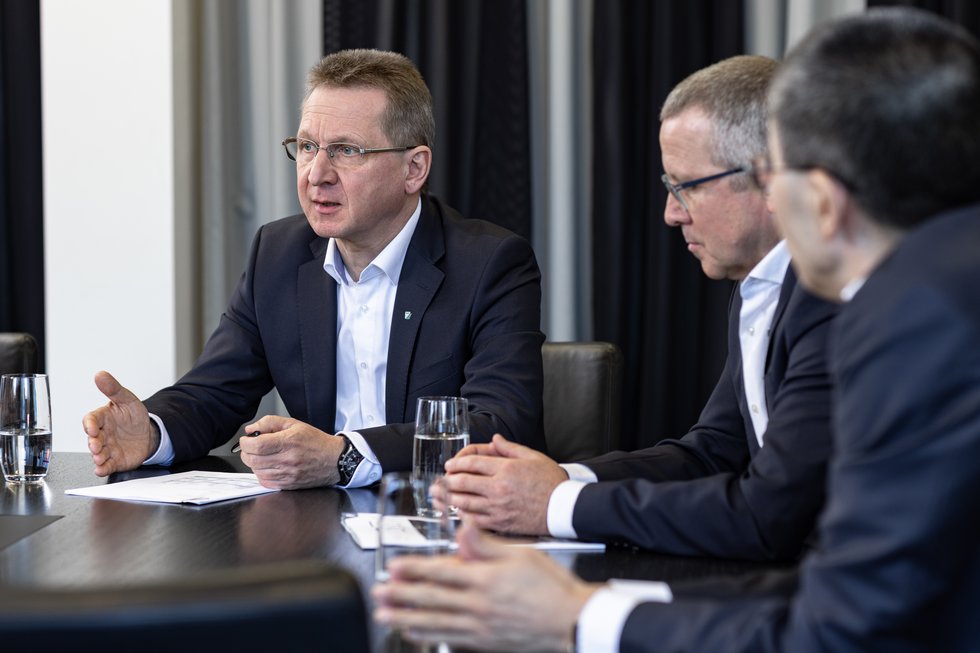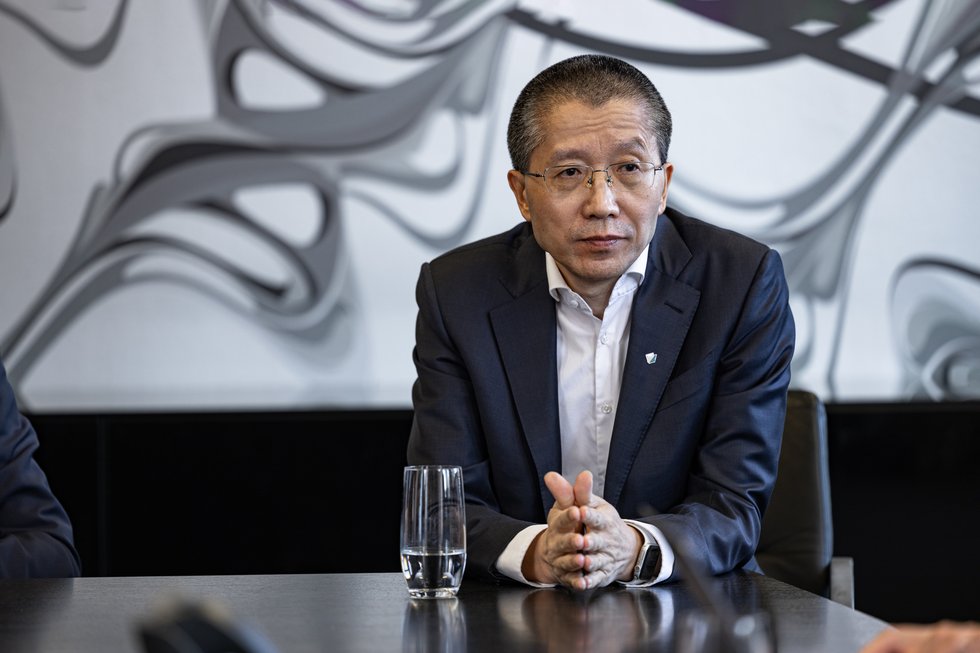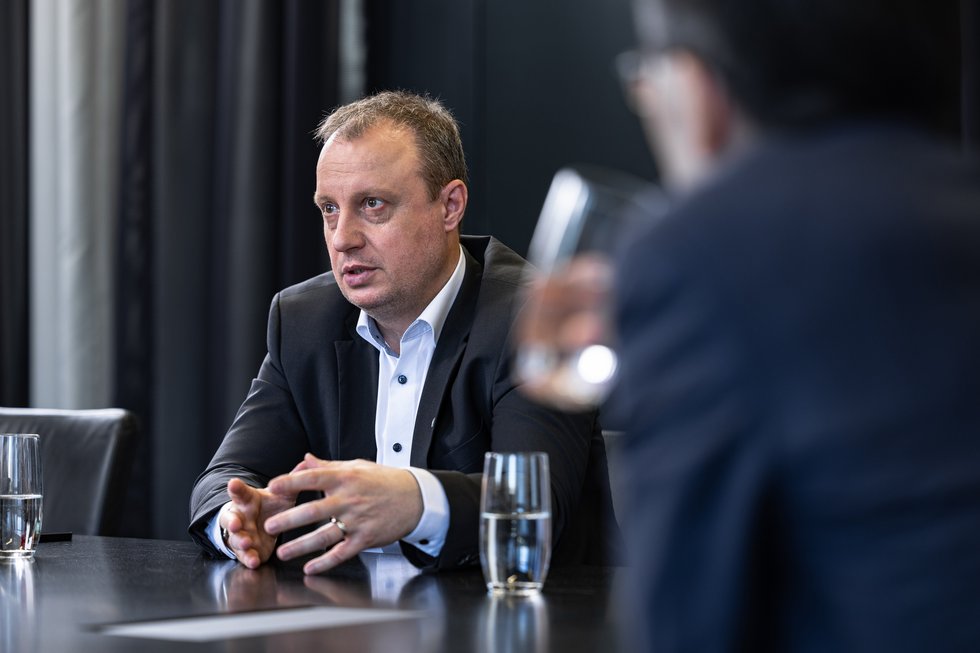Robert Machtlinger (CEO), Andreas Ockel (COO), Aleš Stárek (CFO), as well as Yongsheng Wang (CCO) are talking about continued stabilization and a return to the growth path both in the aviation and aerospace industry and for FACC proper.
Mister Machtlinger, even if economic dynamism has gained momentum lately, 2021 was another challenging year worldwide, especially for the aviation sector. How did FACC fare in this environment?
Robert Machtlinger:
In retrospect, the overall picture is definitely positive: Our objective for the financial year 2021 was to reach an operational turnaround in the new market environment – this was implemented successfully. And the roll-out of our strategy roadmap FACC 2030 was implemented, too. Specifically speaking, our turnover was in line with our expectations, our growth target in acquisition was reached with new orders of approx. USD 1 billion, even in our new business segments. In particular, I’d like to mention our first development order in the space segment. Our international footprint was enlarged by two new locations, and we achieved an operating result that is even higher than our planned value. All this shows that we are on the right track. Unfortunately, the ruling of a London arbitration court as regards a dispute with a supplier going back to orders from the years 2009 to 2012 spoiled all this success – but this one-off effect will not affect our solid upward trend in operations.
So, what are the specific figures for 2021?
Aleš Stárek:
With group sales of EUR 497.6 million, we achieved an operating result of EUR 4.3 million, which means we clearly reached the intended turnaround. Because of negative special effects of EUR 29.4 million – of which almost EUR 25 million due to the ruling of the arbitration court and the rest follow-up items because of COVID-19 – the EBIT is still EUR –25.1 million. For 2022, we expect a clear upward trend driven by a strong growth in sales.
Why did the ruling of the arbitration court come as such a surprise?
Robert Machtlinger:
Because all legal advisers predicted another outcome. In our view, we fulfilled all contractual obligations and always tried to find an out-of-court solution. Unfortunately, we did not succeed, and the ruling of the court did not turn out as expected. We immediately started to make provisions for the payments imposed on us – which will become due in the second half of 2022 – so that the outflow was already fully handled in the past financial year.
Turning back to operations: What are the signals you receive from the market, and what about the medium- to long-term perspective?
Robert Machtlinger:
The growth prospects over 20 years are fully intact – with COVID implicating a delay by two to three years at most. Air travel demand – and thus the demand for new aircraft – shows a stable upward tendency in the medium and long run. The need for highly efficient aircraft is higher than ever. By 2040, the market will require approx. 40,000 new aircraft. People want to travel. This has become especially apparent in the COVID period: Wherever restrictions were loosened, bookings shot up. The US aviation market has already reached 85 to 87 percent of its pre-COVID volume, China has achieved about 80 to 85 percent. In Europe, too, we have seen a significant easing in the past few months, with business jet flights even outperforming the pre-crisis level. Therefore, the prospects for 2022 are positive again, both for the aerospace industry and for us.
And this is not affected by the invasion of the Ukraine by Russia?
Robert Machtlinger:
As terrible and unbelievable this situation may be on the whole, it plays only a minor role in our direct business with Russian customers, since only approx. 0.25 percent of our sales relate to Russia. Nor do we have any supply chains in the Ukraine or in Russia. The order backlog of western aircraft for Russia is negligible, being approx. 3.5 percent of the world market. Moreover, there is such a strong demand for short- and medium-haul aircraft that it can be redirected easily.
Of course, we fully support the imposed sanctions and have stopped our deliveries. What cannot be predicted, however, is the impact of acts of war on the price development and the supply situation as regards energy and raw materials – especially with regard to titanium which mainly comes from Russia – as well as on the general development of the inflation rate. Right at the beginning of the invasion, we established a task force to observe the situation on a daily basis and make decisions directly in close coordination with our customers and partners.
Andreas Ockel:
As a former NATO pilot serving the cause of peace in freedom in a well-fortified democracy, I am deeply shocked by what has happened in the Ukraine in the past three weeks. Our full solidarity is with the Ukrainian people and their right of self-determination. The countermeasures taken by the Western world have already made a noticeable impact. It is very important that we keep them up resolutely and take all further steps with a level head. To actively help people in need, the FACC crew and their families collected warm clothing, food, and commodities. Within a very short time, 40 tons of relief supplies were loaded on trucks going to a distribution center in Poland. The same quantity, another 40 tons, was delivered a week later. I greatly appreciate this solidarity shown by the FACC crew who has sent a clear message of helpfulness. Such help will be required for weeks and months to come. As far as our company is concerned, we will make up for the disruptions in the supply chain as far as possible by responding very flexibly. In the end, the price increases the global economy as a whole has to deal with right now are the price we pay for freedom!

So, demand is consistently high in spite of the COVID-19 pandemic and the Ukraine crisis.
Robert Machtlinger:
Yes, this is reflected not least in the high order intake of the past year. As already mentioned, we were able to secure new orders on the order of USD 1 billion within only one year. The most important of them relate to structural components – elevators and rudders to be precise – for the Airbus A220 family, as well as important interior and engine components for Bombardier, Pratt & Whitney, and Rolls-Royce. By the way, the big manufacturers have again confirmed their forecasts for aircraft demand in the 20 years to come – Boeing and Airbus, for example, expect the delivery of almost 40,000 to 44,000 new aircraft worldwide by 2040. Of course, this is also positive for us, the more so as we are represented with our technologies on all important platforms.
In the Chinese market, too, the development seems to be positive ...
Yongsheng Wang:
Absolutely, China continues to be a stable market with a solid demand. The rates for COMAC ARJ21, for which FACC manufactures the cockpit and passenger cabins, have grown further. All in all, 66 aircraft of this type have already been delivered. In parallel, all tests for the new COMAC C919 have been performed as planned and completed in 2022. The airworthiness certification of this aircraft, for which FACC produces cockpit and cabin equipment, spoilers and winglets, is expected for 2022. FACC has already delivered the first serial components for COMAC C919, and ten more units are scheduled for 2022. This shows that the market entry in China in 2004 and the strong commitment of FACC to the continuously growing Chinese market have turned to account.
And what about the new business segments Urban Air Mobility and Space?
Robert Machtlinger:
Here, too, we are glad to see a strong dynamism. In the Space segment, we managed to obtain an order from the European Space Agency ESA already in the first year of developing this market – namely for a central structural component of the new Ariane 6 launch vehicle, the so-called kick-stage main structure. This is also a valuable reference project for us which we can bring to bear when talking to big suppliers in the space sector. And to get closer to our potential customers in this field, we have also substantially expanded our US sales team in Seattle.
In the Urban Air Mobility segment, we have been active together with our Partner EHang for some time now, making good progress. Meanwhile, some 80 EHangs have been in service in the transportation of cargo and passengers on the basis of individual licenses. They have already completed about 20,000 flight hours, 12,000 of which with people on board. Last but not least, these services serve the purpose of collecting data for the registration documents. We expect official authorization in China on this basis as early as 2022. In Austria, we regularly carry out regional pilot projects with EHang and other partners. A good example of this are cooperations with the Austrian Red Cross and/or with hospitals as regards the transport of pharmaceuticals, blood bags, and organs. Here, we notice a lot of interest from politics and authorities.
Besides, we are busy working on a second Urban Air Mobility project for which we delivered the first flying components in July 2021, after approx. one year of development work. We are not allowed to communicate more details on this right now, but we expect – if the forecasts are right – annual sales on the order of a high two-digit million dollar amount from 2025 onward.
With the new strategy FACC 2030, you have also set out to reach other goals, such as the optimization of operations ...
Andreas Ockel:
After the implementation of the cost optimization scheme introduced at the beginning of 2020, we already started into the year 2021 with a strengthened organization. On this basis, the intended operational stabilization has been very successful – up to a clearly positive operating result. An important measure in this respect was the reduction of our stocks of raw materials as well as semi-finished and finished products. Of course, this resulted in released cash flows and the further reduction of our lead times in production. The balancing act here has been to keep our quality level as high as usual, to ensure our delivery capability, and to secure our supply chain in spite of the distortions caused by COVID. My executives know my motto “Delivering is key!”. Apart from the commercial aspect of the intended cost saving, there is also an operational factor. I think we have perfectly mastered this balancing act. The COMPETE Partner Program, which describes the guidelines of our purchasing, has also substantially contributed to this – for example by suggesting ways to optimize our supply chain and to focus on those suppliers we want to grow with together on a long-term basis.
... as well as increased vertical integration.
Andreas Ockel:
The implementation of our insourcing strategy, too, has made good progress. Apart from metal machining, in which we invested at our Reichersberg location back in 2020 and which has since gained in volume, we included the entire logistics in our house in 2021. For one thing, this applies to Warehouse Logistics, i. e., material and inventory management, which is fully covered by our own processes by now. In a second step, we have organizationally combined internal logistics in production with inventory logistics. And finally, we have integrated the very complex packaging logistics of aircraft components into the company. Thus, logistics has become an essential part of the value chain within FACC – all this with further potential to optimize processes. In all three segments, the transition has been smooth and without affecting our delivery capability. And though it is according to my expectations, I am pleased all the same that everything has come off as intended. In total, some 200 employees work in this field. It should also be mentioned that our logistics experts were instrumental in our packaging the relief supplies for Ukraine and having them dispatched so quickly.

In parallel, you have also expanded your footprint by establishing new locations ...
Andreas Ockel:
First of all, there is our new Plant 6 near Zagreb, which is also dedicated to vertical integration as we perform work steps there that were previously done externally. Specifically speaking, this is the surface treatment of interior parts, especially the overhead stowage compartments of the A320 family. This insourcing strategy will be continued, and Plant 6 is the cornerstone we laid for this. And by the way, the new factory could be established within a record time of only ten months and went into service in November 2021 after a remarkably short authorization procedure. It will be officially opened in June 2022.
Robert Machtlinger:
Of course, we have questioned this investment against the background of the COVID-19 pandemic, but finally we have decided in favor of its implementation – though on a reduced scale – and are very satisfied with it. The reason for this is not least the qualified skilled personnel available in Croatia due to a good training system. Since last summer, we have thus been able to recruit some 150 employees, another 50 to 100 will follow this year. We even employ IT specialists in Croatia because they are available there. In effect, this means that the expansion into Croatia has not only been a benefit regarding the costs but also a very effective measure to combat the skilled labor shortage prevailing in Austria. Apart from this, it has turned out to be extremely positive in terms of productivity, quality, and cultural fit.
And the second new location?
Andreas Ockel:
The second new location is in Melbourne, Florida. As a subsidiary of our Wichita plant, it is intended to further push our MRO business (MRO – maintenance, repair, overhaul). Being a large market for business jet flights, Florida is the ideal location for this with most of the repair and refurbishing activities taking place there.
Expansions of capacity mean investments – how much did you invest in total in 2021?
Andreas Ockel:
All in all, our investments amounted to almost EUR 20 million – and were thus below the initially released level. In the current environment, we have challenged all investments very critically and then focused on essential projects. About half of the investments were related to the new plant in Croatia, the rest went into new projects, our insourcing measures, as well as an increase in productivity in production through changing to automated assembly line production also suitable for large-scale production. For the time being, we have reduced our investment in Croatia to approx. one third, with an expansion being planned. The premises over there offer ample space for further expansions.
New orders, insourcing, and new locations call for additional employees. How do you deal with the much-lamented shortage of skilled labor?
Robert Machtlinger:
We enter into the competition for the biggest talents by offering an attractive work environment, good career prospects, a wide range of education and training opportunities, numerous additional offers with a view to employee satisfaction, and systematic employer branding. All this is received well. For example, it happens quite frequently that employees find back to us because they consider FACC as the more attractive employer compared to other companies. However, finding the right employees in the right number remains a challenge. Going into Croatia has helped us here, as I’ve said already.

Motivation seems to work well within FACC. For example, you have achieved a very high COVID-19 immunization rate. How did you manage that?
Andreas Ockel:
With more than 80 percent, we are actually far above the average of comparable enterprises, and without imposing any obligation. Yes, we are proud of this. We have made it our management responsibility to be a model in implementing the measures for fighting the pandemic. Comprehensive testing at the workplace and during working hours has become a routine for all of us. Additionally, we have established a mass vaccination site attended to by our own company doctors for our employees and the people around us. By providing full information on all possibly available channels, we have reached an enormously high level of acceptance. After all, 99.8 percent of the workforce have participated in regular tests – resulting in more than 80,000 tests at the location in the financial year 2021 alone – which were performed quickly, unbureaucratically, and in the interest of the health of our crew and their families.
Mister Stárek, at the beginning you talked about the operating figures achieved in 2021. What about financing?
Aleš Stárek:
Our financing is stable in the long run. An important highlight in this respect is certainly the 2021 net debt reduction by more than was planned. With EUR 177.8 million, it is by almost EUR 55 million below the year-start level of EUR 232.1 million. This positive development was mainly driven by a consistent working capital management, especially the reduction of inventory mentioned before, as well as the good payment discipline of our customers. Another very positive aspect is the fact that we could obtain some one-off payments for project developments. In total, we generated a free cash flow amounting to the remarkable sum of EUR 70.5 million.
And by introducing a second factoring program in the second half of 2021, we achieved greater financial flexibility. The same applies to a supply chain financing program we have developed together with a banking partner which we are going to roll out around the middle of the year. It helps us gain even greater agility in working capital management and enables us to offer our suppliers a valuable financing tool.
The London arbitration court ruling required an adaptation of the conditions of your core financing. How did the agency banks respond to this?
Aleš Stárek:
They were extremely cooperative and confident. The one-off effects from the ruling jeopardized compliance with the financial covenant regarding our syndicated loan, and this could be settled by adaptation of both the calculation method and the covenant proper in negotiations on a partnership basis. That this has been achieved within a very tight time frame reflects the good mutual relationship and the confidence our banking partners have placed in us, which we appreciate very much.
Confidence is also an essential factor on the stock market. How do you assess the performance of your share, and what are the arguments in favor of a (continued) investment into FACC?
Aleš Stárek:
By and large, our share performance develops in parallel to that of our peers – which means that we are subject to the ups and downs of our industry. However, since its going public, FACC has benefited from its high degree of diversification in terms of products and customers, its advanced technology, its high quality and delivery reliability, as well as its trustworthiness in business. Another asset increasingly gaining in importance is the fact that our technology accelerates the transition to “green” flying and that we also set great store by the recyclability of our products. This makes FACC attractive for a great variety of investors.

Mister Machtlinger, could you finally give us an outlook for the year 2022?
Robert Machtlinger:
After two very challenging years, 2022 will be a year of growth. In 2021, we paved the way for expansion by achieving the operational turnaround and securing a high volume of incoming orders; now, we are gaining momentum. In 2022, we expect an above-average increase in sales of approx. 10 percent, with the EBIT being in the low two-digit million euro range. This means a triplication, which should be obtainable also via positive volume effects on profitability. The background for this optimistic assessment is a rising aircraft demand, mainly in the short- and medium-haul segment, and a corresponding increase in production rates. What we are most interested in is the A320 family which is currently the most successful aircraft on the market, and we are a major player here. But in the field of business jets, too, production figures are rising. To handle the increasing volume, we well hire more than 200 new employees at our locations in Upper Austria. Moreover, we will invest EUR 150 million in technology, research & development, production, as well as new projects in the next five years. So, I can only repeat what I said at the beginning: We are on the right track.